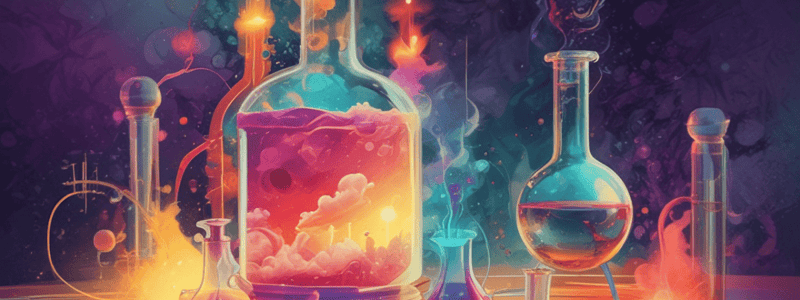Podcast
Questions and Answers
Which term refers to the speed at which a chemical reaction occurs?
Which term refers to the speed at which a chemical reaction occurs?
- Activation Energy
- Concentration
- Reaction Rate (correct)
- Collision Theory
What term describes the amount of substance present in a system?
What term describes the amount of substance present in a system?
- Activation Energy
- Concentration (correct)
- Surface Area
- Reaction Rate
What is the minimum amount of energy required for a chemical reaction to occur?
What is the minimum amount of energy required for a chemical reaction to occur?
- Activation Energy (correct)
- Catalyst
- Collision Theory
- Surface Area
Which factor affects the rate of a reaction by influencing the number of collisions between reacting particles?
Which factor affects the rate of a reaction by influencing the number of collisions between reacting particles?
What is a substance called that increases the rate of a chemical reaction without being consumed?
What is a substance called that increases the rate of a chemical reaction without being consumed?
What is the term for a substance that decreases the rate of a chemical reaction?
What is the term for a substance that decreases the rate of a chemical reaction?
What is the term for a catalyst that exists in the same phase as the reactants?
What is the term for a catalyst that exists in the same phase as the reactants?
Which term describes a catalyst that exists in a different phase from the reactants?
Which term describes a catalyst that exists in a different phase from the reactants?
What theory explains how molecules must collide in a specific way for a chemical reaction to occur?
What theory explains how molecules must collide in a specific way for a chemical reaction to occur?
What is the term for the energy required to start a chemical reaction without the assistance of a catalyst?
What is the term for the energy required to start a chemical reaction without the assistance of a catalyst?
What is the measure of the amount of a substance in a given volume?
What is the measure of the amount of a substance in a given volume?
Flashcards are hidden until you start studying
Study Notes
Types of Catalysts
- A homogeneous catalyst exists in the same phase as the reactants.
- A heterogeneous catalyst exists in a different phase from the reactants.
Energy of Reaction
- The energy required to begin a chemical reaction without a catalyst is shown by the uncatalyzed reaction curve.
- The energy required to begin a reaction is lowered by the addition of a catalyst, shown by the catalyzed reaction curve.
Key Concepts
- Concentration refers to the amount of substance present in a system.
- Reaction Rate describes the speed at which a chemical reaction takes place.
- Activation Energy is the minimum amount of energy required for a chemical reaction to occur.
Factors Affecting Reaction Rate
- Surface Area affects the rate of a reaction by influencing the number of collisions between reacting particles.
- Concentration affects the rate of a reaction by influencing the number of collisions between reacting particles.
Catalysts and Inhibitors
- A catalyst is a substance that increases the rate of a chemical reaction without being consumed in the process.
- An inhibitor is a substance that decreases the rate of a chemical reaction.
- An activated complex is not a catalyst, but rather a temporary species formed during a reaction.
Studying That Suits You
Use AI to generate personalized quizzes and flashcards to suit your learning preferences.




